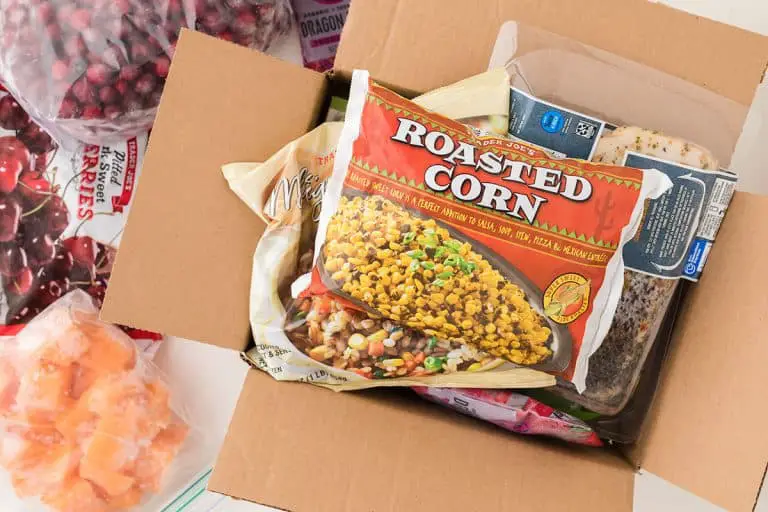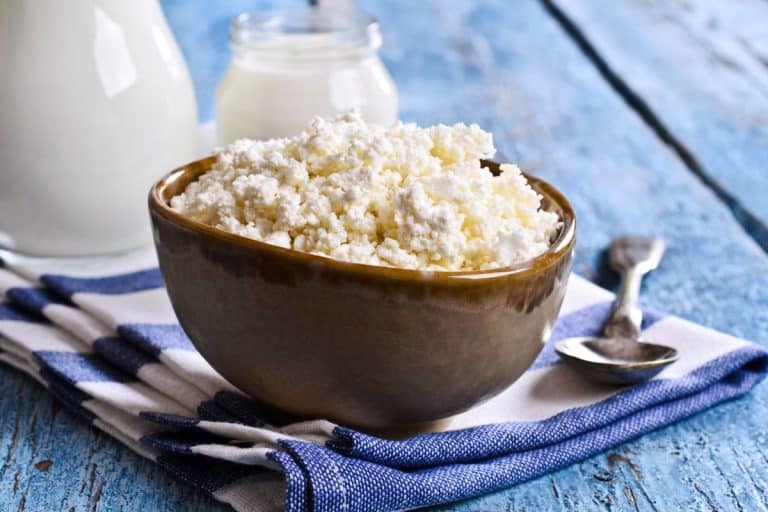Can You Freeze Cooked Pasta? (YES! Here’s How!)
Can you freeze cooked pasta? YES, you can!
When it comes to cooking pasta, it’s easy to make too much. Many people love to make a big batch of noodles for dinner, but then they find themselves stuck with more than they can eat before it goes bad. Freezing is the perfect way to make sure it doesn’t go to waste!
There are several benefits to freezing your leftover cooked pasta noodles.
- It lasts a lot longer than if left out in the fridge.
- Frozen noodles can be reheated directly after removal from the freezer, so there’s no need to wait for them to thaw.
- Forgot to pull something out for dinner? No problem! You can have a fresh-made meal on the table in under 15 minutes without all the work!
In this post, we are going to talk about how to freeze your leftover pasta and offer some tips on how to freeze it correctly so that the noodles reheat perfectly every time, leaving you with a delicious meal ready for any night of the week!
Tips on Freezing Cooked Pasta
Technically you can throw your noodles into a reusable freezer-safe bag and then toss them in the freezer straight out of the pot and be done with it. This may or may not yield decent results when you go to reheat the leftover pasta. If you want to make sure your pasta is going to taste as good as the day you made it, try some of these tips.
- Cook pasta just until al dente and then rinse it off with cold water to stop the cooking process. This will give your pasta enough “wiggle room” when reheating and keep it from turning into mushy noodles.
- Cool the pasta completely before adding to the freezer and be sure not to overfill your containers as the pasta will expand when frozen.
Can you freeze cooked pasta with sauce?
If you like to mix your pasta noodles and sauce together before serving and you end up with a bunch of leftovers, you can freeze the two together.
To freeze pasta with sauce: Put the leftovers into a freezer-safe container, cover, and label before freezing.
You can also mix your leftover noodles and sauce together in one dish to make sure they are well combined for quick reheating later on! This is especially helpful if you don’t have time to package them up separately.
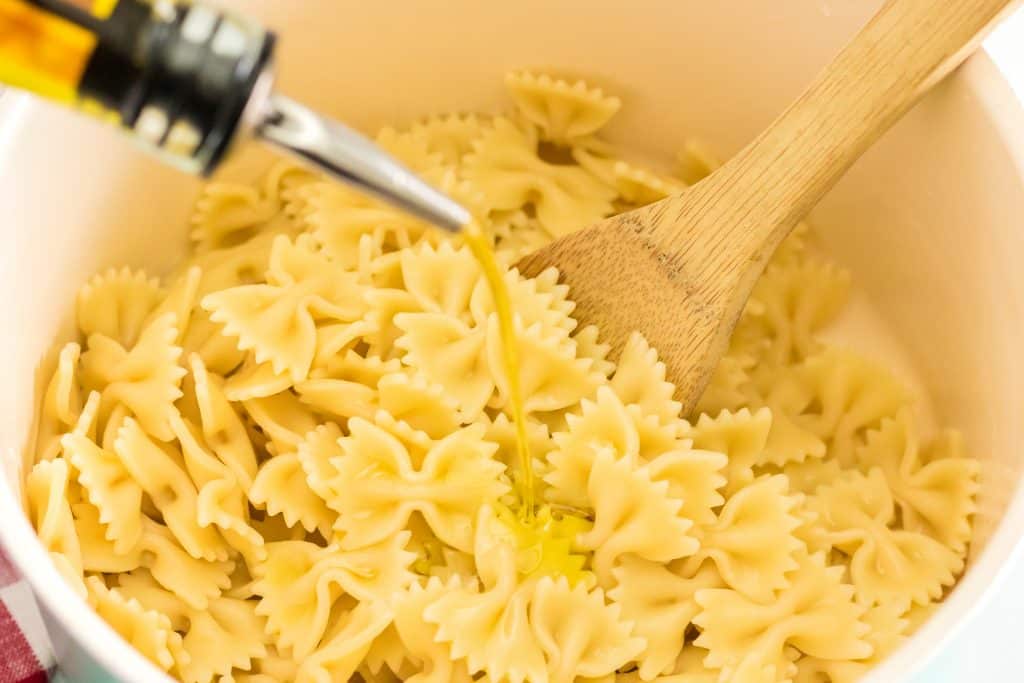
How to freeze pasta noodles so that they don’t stick together
While it is nearly impossible to freeze noodles like spaghetti, fettuccini, or linguini without them sticking together (regardless if you’re freezing them with or without sauce, they will most likely stick), you can freeze them in small batches by separating the noodles and laying them out on parchment-lined baking sheets the best you can.
For this post, we used bow tie noodles for our images and kept them from sticking together by using olive oil and by separating out each piece using the pre-freeze baking sheet method. Keep in mind you don’t have to make straight, even rows when spreading out your pasta; you just don’t want them to touch. You can use a spoon and spread the pasta out as best you can. This works for cooked unsauced noodles like macaroni, ziti, penne, rigatoni, etc.
If your pasta is sauced, regardless of what kind of noodle it is, they are going to stick. Even so, they will still taste just fine.
How to Freeze Cooked Pasta without sauce
To freeze cooked pasta without sauce, you will want to undercook the pasta slightly. You don’t need to only cook for 5 minutes if the box tells you to cook for 10, but you should only cook for 8 minutes instead of 10. This prevents the pasta from overcooking when you reheat it.
As soon as your timer goes off, drain your pasta and rinse well in cold water to stop the cooking process. Return the noodles to the pot.
Toss and coat the cooked pasta with a tablespoon of olive oil for a full 16oz box. This will help keep the pasta from sticking upon reheating.
Scoop the noodles onto a lined baking sheet, use either wax or parchment paper to keep the pasta from sticking to the baking sheet. Arrange the pasta in a single layer. It doesn’t have to be pretty as long as they aren’t touching you’re good.
Put the baking sheet in the freezer for 2-3 hours to let the pasta semi-freeze.
After the 3 hours are up, remove the pasta from the freezer, take a spatula, and gently separate the noodles from the parchment or wax paper. Transfer the frozen pasta to freezer-safe bags and put them back into the freezer for later use!
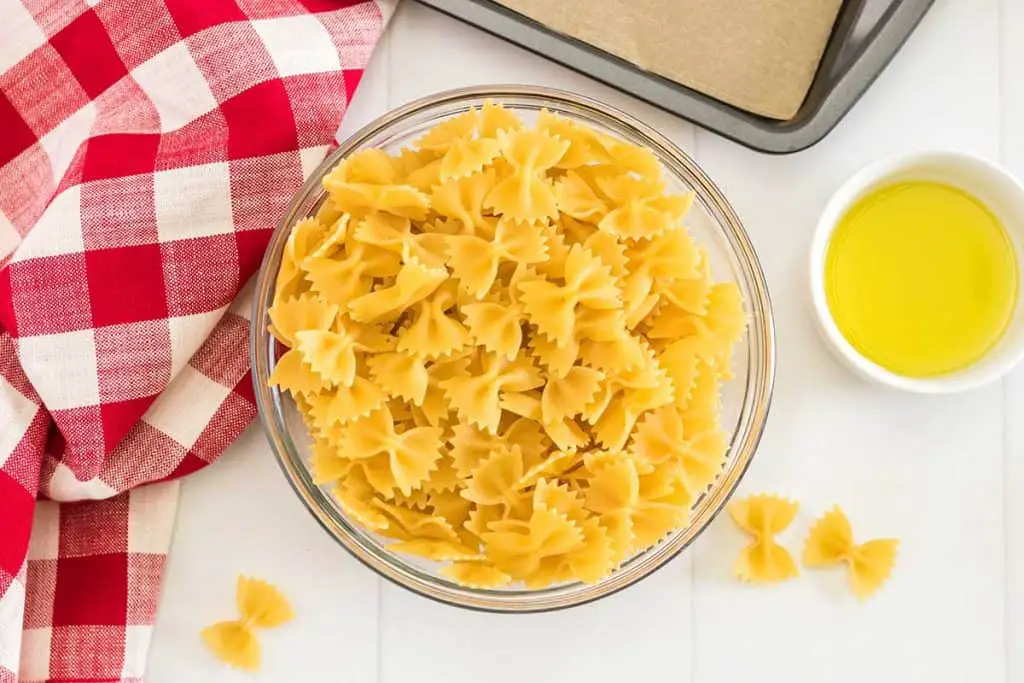
How to Freeze Cooked Pasta with sauce
Freezing cooked pasta with sauce isn’t too different than freezing without.
Before freezing, you’ll still want to let your pasta cool, even if it has sauce on it. Just don’t run it under cold water.
After the pasta and sauce are cool, combine them (if they aren’t already) and place them in a freezer-safe dish or reusable freezer-safe bag to prevent freezer burn. If you want to freeze individual portions, you can line a baking sheet with parchment paper, create a mound of the desired portion, and follow the same instructions as above for freezing.
If using a freezer-safe bag, you’ll want to get out as much air as possible before sealing. Place the bag flat into the freezer to help conserve as much space as possible.
Does Cooked Pasta Freeze Well?
Absolutely! Pasta freezes so well that you can store it for up to a year, and it will still taste as good as the day you made it. Pasta is one of the most commonly frozen foods because it stands up to freezing so well. Think about when you’re browsing the freezer section at your local grocery store; pretty much every other frozen dinner is a pasta dish.
What Type of Pasta can you Freeze?
You can freeze any type of pasta, but each different type will have a slightly different result when being reheated. For example, if you’re freezing longer kinds of pasta like spaghetti or linguine, you may end up with some clumps from them sticking together when you thaw and reheat them. Thinner pasta varieties such as angel hair are more delicate, and those types of pasta can be overcooked easily when you reheat them.
Macaroni, penne, ziti, bow tie pasta, and the like are good choices for planned cooking, then freezing if you are trying to meal prep.

Can you freeze uncooked pasta?
If your pasta noodles are about to expire, you can freeze them uncooked and then cook from frozen. This might be a better option than pre-cooking and freezing if you’re low on freezer space. Dry pasta has a long self-life in general, though, so it’s not necessary to freeze it right after purchasing.
Can You Freeze Fresh, Homemade Pasta After you cook it?
Yep! You sure can! Just make sure to cook it slightly under, even a little less than al dente, to avoid overcooking the noodles when you go to reheat them. Fresh, homemade pasta tends to be more fragile than the dried pasta you buy at the grocery store.
How long is pasta good for in the freezer?
In a regular freezer, the pasta will last for about three to six months.
In a deep freezer, the pasta will last for at least 12 to 18 months.
It is important that you date the noodles before freezing them, so you’ll know how long they have been in storage and if they are still good! It’s also handy to write what kind of sauce was mixed with your noodles if you decided to blend the two.
How to Thaw Frozen Pasta
You can thaw frozen pasta at room temperature or in the refrigerator. You can also submerge it in a water bath for faster results. We do not recommend defrosting frozen pasta in the microwave. You can overcook it and also risk drying it out, which will give you crunchy pieces.
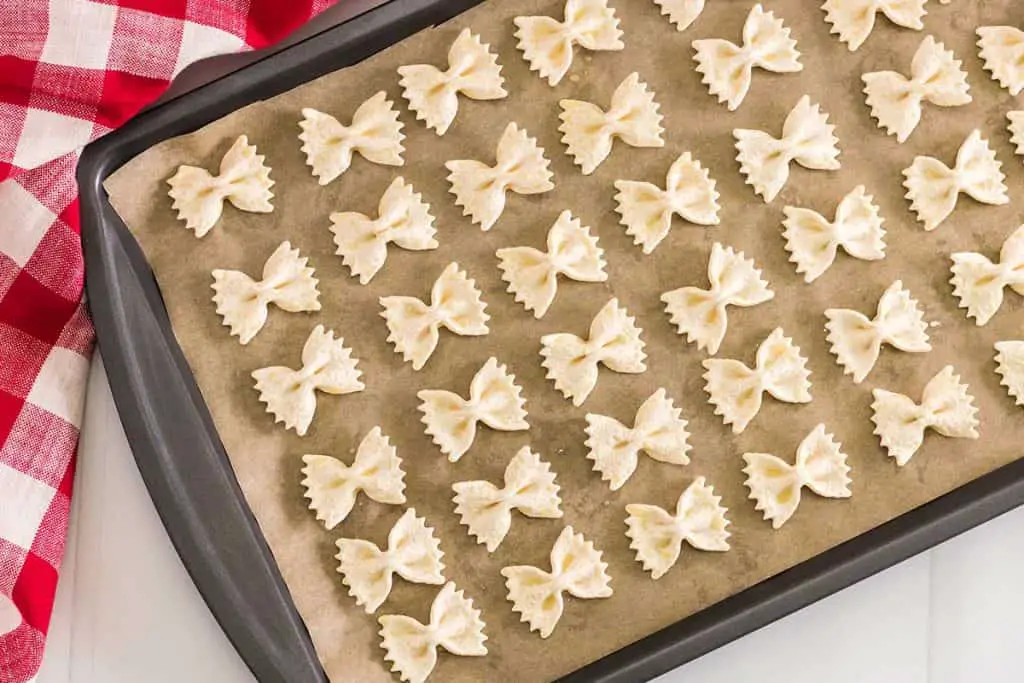
Do you have to thaw frozen pasta before reheating?
Nope! You can take frozen pasta directly from the freezer and reheat it without defrosting beforehand. The best way to do this is by bowling some water, the same as if you were going to cook dry pasta from a box and then add in your frozen pasta cooking for 3-5 minutes.
Can you freeze and reheat, Then freeze pasta again?
Eh, you can, but you most likely do not want to. Once you’ve reheated the pasta, it will no longer be in the al dente state that it was once in when you pulled it from the freezer the first time. While freezing it for a second time won’t hurt anything, the pasta texture may be too mushy to enjoy a third time. It’s best only to reheat the amount of pasta you think you will eat in one sitting.
Can you microwave frozen pasta?
Yes, but you really want to watch it if you decide to use the microwave to reheat frozen pasta. You will want to add a tablespoon of water to keep the pasta from drying out, and instead of microwaving for a long duration of time, use intervals of 30-45 seconds. Make sure to stir the pasta between intervals to keep the noodles from becoming hard and dried out.
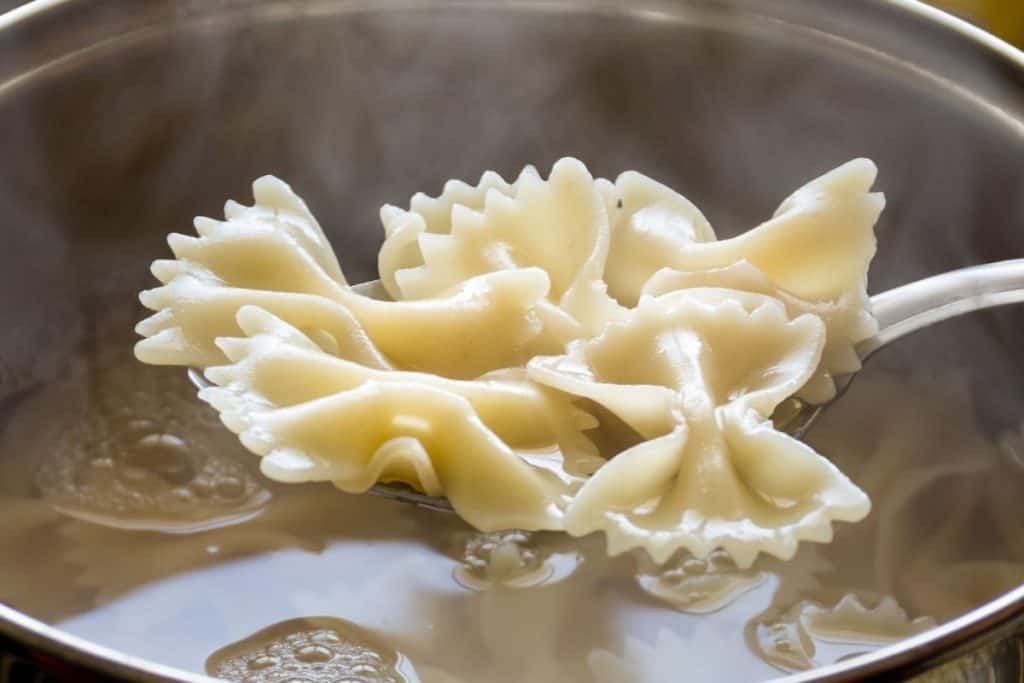
WHAT’S THE BEST WAY TO REHEAT FROZEN PASTA?
The best way to reheat frozen pasta is going to be the stovetop. Treat it the same as you would when cooking fresh or dried pasta. If you’re reheating thawed pasta, you will only need to boil for 1-2 minutes. If your pasta is frozen, boil for 3-5 minutes.
CAN YOU FREEZE LEFTOVER SPAGHETTI AND MEATBALLS?
Yep! Just let your spaghetti and meatballs cool, and then follow the steps above for freezing.
Can you freeze cooked pasta with Alfredo sauce?
We wouldn’t. Cream sauces tend to break once frozen and don’t lend themselves to reheating well. If you really want to, you can, but there is a risk that it won’t reheat well, and then you’ll be out of a lunch or dinner.
CAN YOU FREEZE COOKED PASTA/CASSORALE BAKE?
You sure can! When looking for freezer meals, baked pasta casseroles and easy slow cooker dump meals are high on the list! You can even get aluminum baking tins with lids so you can go from oven to freezer with no clean-up. You do want to watch out for freezer burn, though, so make sure you take it one step further and wrap the baking dish with aluminum foil.
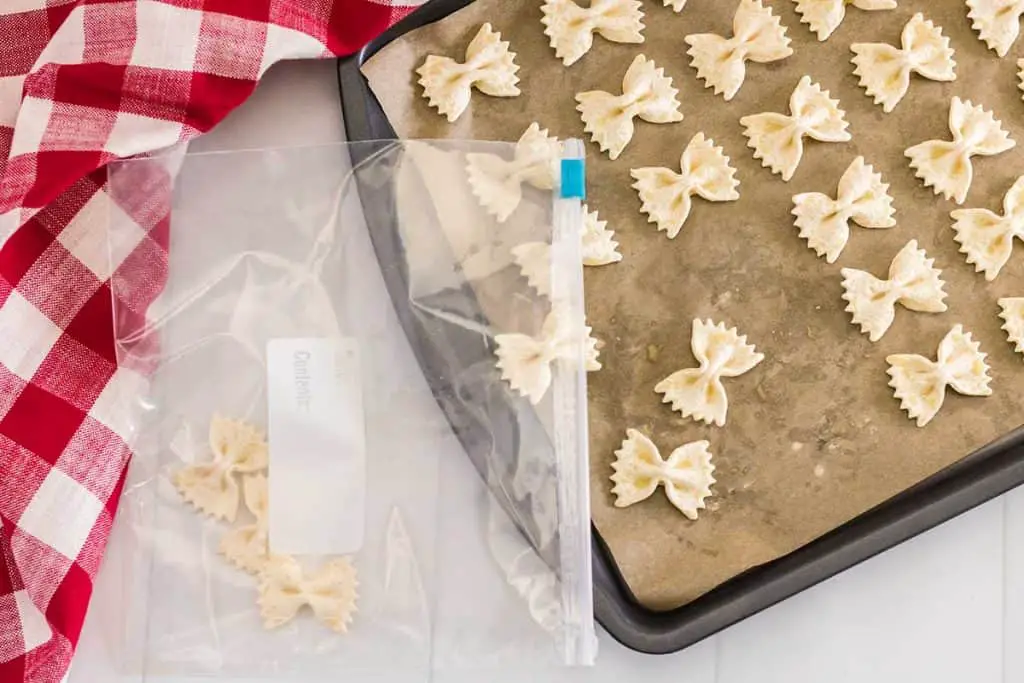
Can I freeze cooked spaghetti?
Cooked spaghetti is a little hard to freeze because of its length. It tends to stick together and may cause issues with reheating. That being said, you can freeze spaghetti in individual portions or all together. There’s no need to follow the parchment paper step if you aren’t going to freeze individual portions. Go ahead and just toss the spaghetti in a reusable zipper bag and freeze.
Can you freeze spaghetti bolognese?
Yes! To freeze spaghetti bolognese (spaghetti with meat sauce), follow the instructions above to freeze pasta with sauce. If you have your pasta and sauce separate, you can still freeze them in two different reusable storage bags.
Can you freeze cooked macaroni?
Sure can. You can freeze cooked macaroni noodles the same way we froze the bow tie.
Can you freeze cooked lasagna noodles?
Yep! Just lay them out on parchment paper and make sure they do not touch. When freezing lasagna noodles, you want to keep them apart and avoid sticking. After you freeze them on the baking sheet, use parchment paper to keep the noodles separated inside of your freezer storage bag to prevent further sticking.
Freezing Pasta is Easy and a Great Way To Save Leftovers
The next time you make some pasta, be sure to cook some extra noodles. There are some exceptions where frozen leftovers may not taste as good (i.e., Alfredo sauce), but they’ll still be delicious with most pasta and sauces after thawing them out. You can freeze the leftovers with or without sauce for an easy and delicious freezer meal that will save you when you need a last-minute dinner during your busy week. We hope this post was helpful! If there is anything else we could help answer about cooking pasta, let us know by commenting below.
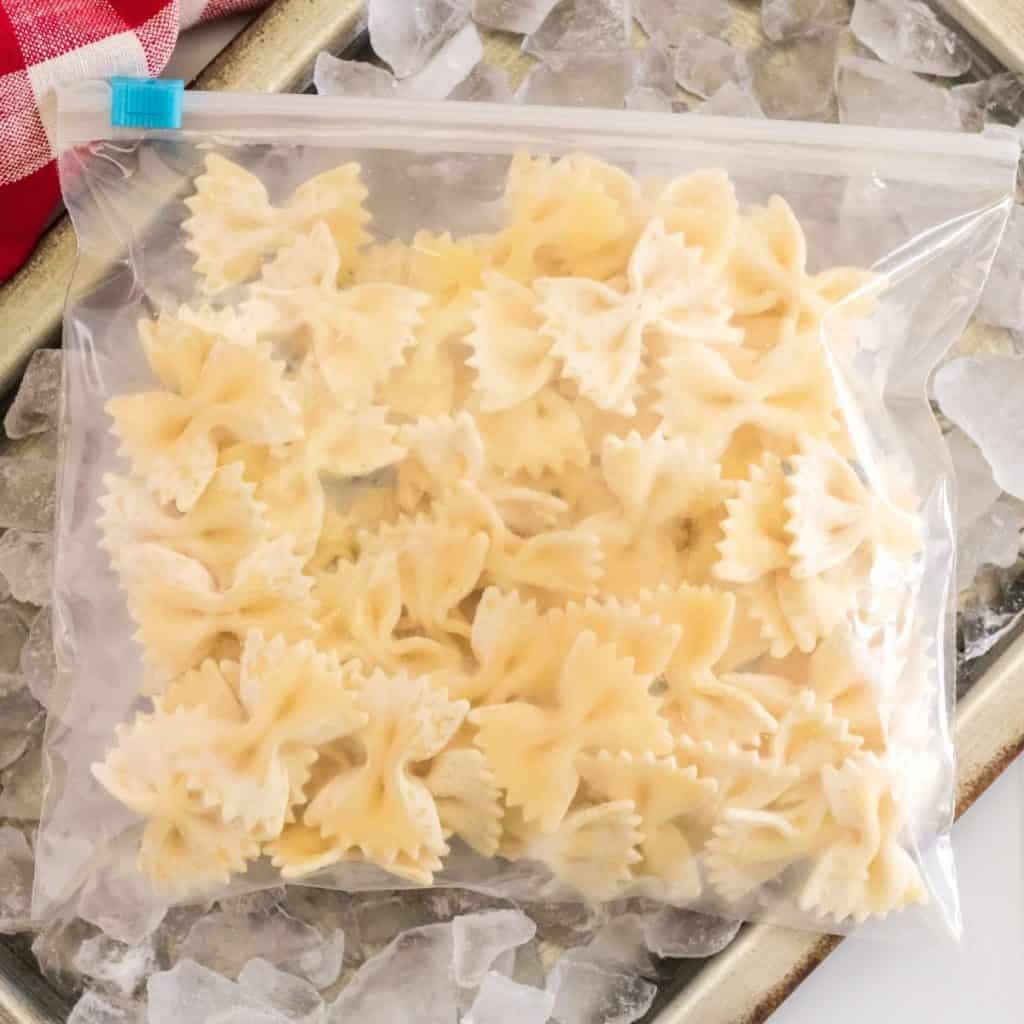
How To Freeze Frozen Pasta
Instructions
How To Freeze Cooked Pasta Without Sauce
- Boil a large pot of water. Add the pasta and undercook by 1 to 2 minutes depending on how al dente you like your noodles.
- Once cooked, rinse the noodles in cold water to stop the cooking process, return the noodles to the pot or a large bowl.
- Toss and coat the cooked pasta with about a tablespoon of olive oil for a full 16oz box
- Line a baking sheet with wax or parchament paper. Scoop the noodles onto the lined baking sheet. Arrange the pasta in a single layer, spread each noodle out to avoid touching.
- Put the baking sheet in the freezer for 2-3 hours to let the pasta semi-freeze.
- After the 3 hours is up remove the pasta from the freezer and take a spatula and gently separate the noodles from the baking sheet. Transfer the frozen pasta to a freezer-safe bags and return to the freezer for later use!
How To Freeze Cooked Pasta With Sauce
- Combine the pasta and the sauce toghether in a large bowl or pot. If still warm, leave out at room temperature and let it cool completly.
- Once cool transfer the pasta into a freezer-safe dish or reusable freezer-safe bag to prevent freezer burn. Remember: If you want to freeze individual portions follow the same intructions above for freezing, but instead of seperating the noodles creat a mound for each individual portion size.
Equipment
Nutrition information provided is an estimate. It will vary based on cooking method and specific ingredients used.



